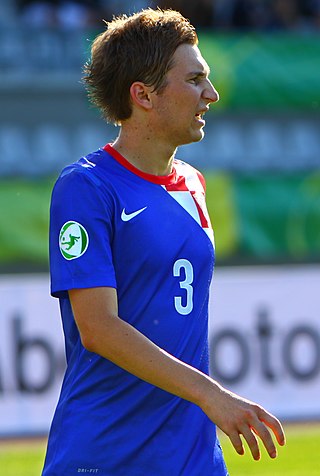
Vukovar is a city in Croatia, in the eastern regions of Syrmia and Slavonia. It contains Croatia's largest river port, located at the confluence of the Vuka and the Danube. Vukovar is the seat of Vukovar-Syrmia County and the second largest city in the county after Vinkovci. The city's registered population was 22,616 in the 2021 census, with a total of 23,536 in the municipality.

Hrvatski nogometni klub Rijeka, commonly referred to as HNK Rijeka, is a Croatian professional football club from the city of Rijeka.

Hrvatski nogometni klub Cibalia, commonly known as Cibalia Vinkovci or simply Cibalia, is a Croatian football club from the town of Vinkovci in eastern Croatia. Cibalia currently play in the Prva NL, Croatia's second-tier league. Their stadium is located in the south part of their home town and can hold 10,000 spectators. The name Cibalia comes from the Roman settlement called Colonia Aurelia Cibalae which was the precursor of the present-day town of Vinkovci. In the period from 1945 to 1990 the club was called NK Dinamo Vinkovci.

Borovo, also known as Borovo Selo, is a village and a municipality in Vukovar-Syrmia County in eastern part of Croatia. Situated on the banks of the Danube river, it shares its border with Serbia and the municipality of Bač on the opposite side. The historical development of Borovo is intricately linked with the Danube, which has played a pivotal role in its development as a notable industrial hub in the region.

HŠK Građanski, also known as 1. HŠK Građanski or fully Prvi hrvatski građanski športski klub, was a Croatian football club established in Zagreb in 1911 and dissolved in 1945. The club had a huge influence on the development of football in Croatia and Kingdom of Yugoslavia and achieved its greatest success in the period between the two World Wars.

Hrvatski nogometni klub Segesta Sisak, commonly referred to as HNK Segesta Sisak or simply Segesta Sisak is a Croatian professional football club located in the city of Sisak. It is named after the Illyrian settlement Segestika from which the modern town of Sisak developed. Founded in 1906, The Old Lady is the oldest Croatian club that still exists under its original name.

Borovo Naselje is a Vukovar borough located on the right bank of the Danube river in the Croatian region of Slavonia, 4 kilometers northwest of Vukovar town centre; elevation 90 m. The economy is based on rubber and shoe industries. The routes D2, D55 and D519 intersect in Borovo Naselje, connecting Vukovar to Osijek, Vinkovci and Dalj, respectively. The suburb originally developed as a part of Borovo village and its cadastral community but was subsequently separated and incorporated as a part of the town of Vukovar in 1980's.
Milan Antolković was a Croatian footballer who played international football for both the Croatian and Royal Yugoslav national teams.
Gyula Feldmann was a Hungarian football player and coach.

Nogometni Klub GOŠK Gabela is a professional association football club based in Gabela, near Čapljina, Bosnia and Herzegovina. The name GOŠK in Croatian, is the abbreviation of "Gabeoski Omladinski Športski Klub". Currently, the club competes in the Premier League of Bosnia and Herzegovina, following promotion from the First League of the Federation of Bosnia and Herzegovina.

Sportski klub Jugoslavija, commonly known as Jugoslavija, was a Serbian football club based in Belgrade. It was originally formed as SK Velika Srbija in 1913 and changed its name to SK Jugoslavija in 1919. They were among the most popular Serbian and Yugoslav clubs, and they were nicknamed as "Crveni" because of their red shirts, in opposition to their greatest rivals BSK, who wore blue and were known as "Plavi". Until 1941 the sports society Jugoslavija, beside football, also included sections for athletics, cycling, winter sports, basketball, boxing, wrestling, swimming, and table tennis.

Nogometni klub Železničar Maribor, commonly referred to as NK Železničar Maribor or simply Železničar, was a Slovenian football club from Maribor. They qualified for the top division of Slovenian football, the Slovenian PrvaLiga, in the 1992–93 season, but were relegated in their first season, never returning to the top level. They were one of the most successful Slovenian clubs in the Yugoslav era, winning the Slovenian Republic League four times and the Slovenian Republic Cup twice.
Slavko Šurdonja was a Croatian football player who appeared for Yugoslavia in international competitions.
Sándor Nemes, also known as Alexander Neufeld, was a Hungarian football player and manager. He had a playing career in Hungary, Austria, Switzerland, United States and Yugoslavia, and he represented the national teams of Hungary and Austria.
Károly Nemes was a Hungarian football goalkeeper and coach. He is best known for his work on champion teams of SK Rapid Wien and SK Jugoslavija. He coached throughout Central and South-Eastern Europe.
Nikola Perlić was a Yugoslavian footballer who played in top league clubs in Yugoslavia and France, and played for the Yugoslavia national team.

Ivan Aleksić is a Croatian footballer who plays as a left back for Vukovar.
Đorđe Detlinger was a Serbian footballer.
Anton Bilek was an Austrian football manager and former player.

Borovo is a Croatian shoe manufacturer. It was founded in 1931 in the village of Borovo near Vukovar. It had its greatest success during the time of the former SFR Yugoslavia thanks to its own production of shoes as well as its most famous product, Borosana shoes.











